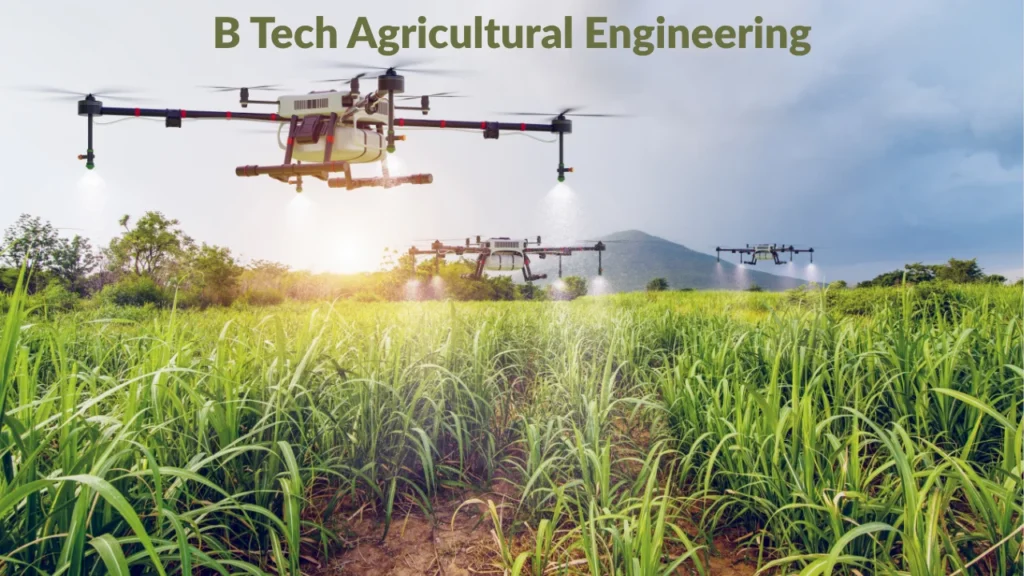In a world where food demand is rising and natural resources are shrinking, agriculture must evolve. That’s where b tech agricultural engineering steps in. This course connects technology with agriculture to create better, faster, and smarter ways of farming. It turns traditional farming into a high-tech system that supports sustainable food production.
Many students today are looking beyond basic engineering streams. They want a career that helps people, nature, and also offers good job options. If you’re one of them, b tech engineering might just be the perfect path. Colleges near innovation hubs like Amar Madhuban Tech Park are leading this change by offering top-notch education in this field.
Let’s dive deeper into what this course is about, what you’ll learn, who can apply, and what opportunities are available after graduation.
What Is B Tech Agricultural Engineering?
B Tech Engineering is a four-year undergraduate program. It blends science and technology with agriculture. Students learn how to design machines, systems, and tools that help farmers grow food more efficiently.
This program teaches you how to use engineering to solve farming problems. You will study topics like farm machinery, irrigation systems, food processing, and soil conservation. The goal is to make farming faster, easier, and more productive using smart tools.
This course is ideal for students who enjoy solving problems, working with technology, and want to contribute to feeding the world.
Eligibility and Admission Process
To join b tech agricultural engineering, students must complete their 10+2 education with Physics, Chemistry, and Mathematics. Entrance into most colleges is through engineering entrance exams. These include JEE Main, ICAR AIEEA, or other state-level exams.
Here is a simple table to show you the admission details:
| Admission Criteria | Description |
|---|---|
| Minimum Education | 10+2 with PCM (Physics, Chemistry, Math) |
| Entrance Exams | JEE Main, ICAR AIEEA, State CETs |
| Course Duration | 4 Years (8 Semesters) |
| Admission Type | Merit-Based or Entrance Score |
Students should prepare well for these exams to get into a reputed college.
What You Study in the Course
The b tech engineering course covers both theoretical and practical subjects. It is designed to help students understand nature and machinery together.
Subjects are divided semester-wise. You’ll learn about basic engineering in the first year, and advanced topics like irrigation and food processing in the later years.
Semester-wise Course
| Semester | Major Subjects |
|---|---|
| 1st & 2nd | Physics, Chemistry, Maths, Basic Engineering |
| 3rd & 4th | Fluid Mechanics, Thermodynamics, Soil Science |
| 5th & 6th | Farm Machinery, Food Processing, Irrigation |
| 7th & 8th | Projects, Industry Training, Environmental Engineering |
These subjects help students understand how to design machines, manage water systems, and improve crop output using science.
Benefits of Studying B Tech Agricultural Engineering

One of the biggest benefits of b tech engineering is that it opens doors to a wide range of careers. You’re not limited to farms or fields. You can work in labs, factories, government offices, and even in foreign countries.
This course also promotes innovation. Students learn how to create new devices, apps, and systems that make farming more efficient. It’s a field where creativity meets science.
By the end of the course, you’ll have both the knowledge and practical skills to build a successful career.
Career Options After Graduation
Graduates of b tech engineering have many job opportunities. You can work with government agencies, private companies, and research institutions. The roles range from designing machinery to managing irrigation systems.
Common Career Roles
| Job Title | Role Description |
|---|---|
| Agricultural Engineer | Designs and tests farm equipment |
| Irrigation Engineer | Plans and manages water systems for crops |
| Soil and Water Expert | Prevents soil erosion and improves soil quality |
| Food Processing Engineer | Works on food packaging and safety |
| Research Assistant | Conducts experiments for agri-tech development |
These jobs offer good salaries and stable careers. Starting salaries range from ₹3 to ₹6 lakhs per annum depending on your skills and location.
Companies That Hire Agricultural Engineers
Many reputed companies look for graduates in this field. These include farm machinery companies, food processing industries, and agri-tech startups.
Top recruiters include:
- John Deere
- Mahindra Agribusiness
- TAFE Tractors
- Indian Council of Agricultural Research (ICAR)
- Amul
- Ministry of Agriculture
- Godrej Agrovet
The demand for agricultural engineers is growing every year, especially with rising interest in smart farming.
Skills You Learn
In a b tech engineering program, you learn more than just theory. You gain real-world skills that help in your job. These include technical and soft skills.
Some important skills are:
- Designing and repairing farm equipment
- Understanding soil and crop science
- Managing irrigation and water systems
- Handling food safety processes
- Communicating and working with farmers
These skills make you job-ready and help you work in different sectors like agriculture, food, or technology.
Use of Technology in Modern Agriculture
Modern farming uses tools like sensors, drones, and GPS. These tools help farmers know when to water crops, add fertilizer, or harvest. B tech engineering students are trained to work with such technology.
Smart Farming Tools
| Tool/Technology | Purpose |
|---|---|
| Drones | Crop monitoring and spraying |
| IoT Sensors | Soil moisture and temperature tracking |
| GPS & GIS | Mapping farm areas for better planning |
| Automated Tractors | Reduce labor and increase accuracy |
| Mobile Apps | Help farmers track and manage their farms |
These smart tools improve crop quality and save time. Students also learn coding and data analysis to help create or improve such systems.
Events like the Future Tech Olympiad often showcase how students can innovate using such smart technologies in agriculture.
Government Schemes and Support
The government supports agriculture in many ways. There are schemes that help farmers buy machines and get training. These also create jobs for engineers.
Some key programs include:
- Pradhan Mantri Krishi Sinchayee Yojana: Supports irrigation projects
- Soil Health Card Scheme: Helps in better fertilizer usage
- PM-KISAN Yojana: Direct income support for farmers
- SMAM Scheme: Subsidies for farm machinery
Engineers from this course can help implement these schemes on the ground.
Higher Education and Global Opportunities
After finishing your b tech engineering, you can go for higher studies. Some students do M.Tech in the same field. Others switch to MBA or go abroad for MS.
You can also take exams like GATE or UPSC if you want government jobs or research positions.
Many students work in countries like the USA, Canada, and Australia. These countries need smart farming solutions and hire engineers from India.
Challenges in the Field
While this field has huge potential, it comes with a few challenges. Many rural farmers don’t have the money to buy new machines. There is also a lack of awareness about smart farming.
Another major challenge in rural agriculture is the lack of funds. Many small-scale farmers struggle to afford modern machinery or adopt advanced techniques due to limited financial resources. This slows down progress and makes it harder for them to increase productivity.
Graduates of b tech engineering can make a real difference in these areas. By designing affordable, easy-to-use tools and sharing knowledge with local communities, they help farmers improve their methods without high costs. Their work brings innovation to the grassroots level, creating lasting impact.
Colleges That Offer This Program
India has many top colleges offering this course. Some are government institutes, while others are private colleges with great facilities.
Popular Colleges
| College Name | Location |
|---|---|
| Indian Institute of Technology (IIT) | Kharagpur |
| Tamil Nadu Agricultural University (TNAU) | Coimbatore |
| Punjab Agricultural University | Ludhiana |
| NIT Silchar | Assam |
| Junagadh Agricultural University | Gujarat |
Choose a college that offers good labs, projects, and industry training for the best experience.
Conclusion
B tech agricultural engineering is not just a degree. It’s a mission to improve lives, protect the environment, and feed the growing world. It connects young minds with farming problems and gives them the tools to solve them using technology.
This course offers strong career options, real-world impact, and the chance to work in one of the most important sectors — food. If you love nature, enjoy using machines, and want a job that helps people, this course is for you.
With support from places like Amar Madhuban Tech Park, and platforms like the Future Tech Olympiad, the future of agricultural engineering looks bright and full of opportunities.
If you’re thinking of a career that’s smart, sustainable, and meaningful, then b tech engineering is a path worth choosing.



